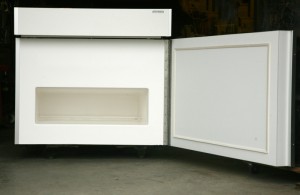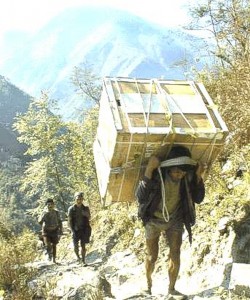Sun Frost R Pb-X Solar Powered Battery Free Vaccine Refrigerator
There are about 2 billion people in the developing world who do not have electricity and in many areas where electricity is available it is only available intermittently. Vaccines for childhood diseases such as polio, measles and diphtheria must be stored at typical refrigerator temperatures, between 2C and 8C (35F and 46F). There are about 4 countries where cases of polio still exists if the children in these countries could be immunized, like small pox, the disease could be eliminated.
There are refrigerators built for remote areas, which are powered by kerosene. However, the units are often unreliable because of poor temperature control, dirty kerosene and problems of maintaining steady supply of fuel. Solar powered refrigerators are gradually replacing kerosene refrigerators. Sun Frost had been building solar powered vaccines refrigerators for the past 15 years and has models in about 50 countries.
The primary components in the refrigerators solar power system are the Photovoltaic panels, charge controller and the battery. The weak link in the system is the batteries which could last between 2 and 8 years. Two years ago “PATH” an NGO supported by the Bill and Melinda Gates foundation put out a request for the development of a battery free refrigerator. They offered to pay for the testing for several companies who submitted what looked like potentially effective designs. PATH offered to pay for testing of a prototype which would be submitted by Sun Frost.
The freezer compartment in a vaccine refrigerator is used for freezing ice packs. The ice packs are placed in an insolated container along with the vaccines allowing the vaccines to be distributed to more remote villages. Unfortunately, WHO’s initial test procedures were unrealistic. After a year of waiting the test procedures was finalized at the end of May, 2010. Initially we will be sending a battery free refrigerator for testing which does not have an ice pack freezer.
A chamber in the refrigerator contains 50 pounds of water. The system compressor is directly connected to a Photovoltaic panel. When the sun is out the refrigerator makes ice in the chamber above the refrigerator storage compartment. A sufficient amount of ice is made to keep the refrigerator cold for 5 days in a 32C (90F) environment without the compressor running.
A layer of water always remains between the ice and the vaccine storage area so that vaccines will never be exposed to freezing temperatures. A condition which could ruin the effectiveness of the vaccines. The refrigerator keeps vaccines at an appropriate temperatures from near freezing temperatures to ambient temperatures above 43C (110F) without adjustment. To my knowledge this degree of temperature stability is not available in any other vaccine storage refrigerator.
Installation of the refrigerator in the field will be simple and require only connecting two wires from the PV panel to the refrigerator. In the R Pb-X the temperature is controlled by monitoring water height as the ice freezes. The R Pb-X has no thermostat and the temperature never has to be adjusted in the field. The system should give over 20 years of trouble free service. In locations where utility power is intermittent an AC compressor could be installed on the Sun Frost R Pb-X. When utility power is available the ice storage compartment will be replenished. The Sun Frost R Pb-X will be capable of keeping vaccines cold for at least 5 days with out power. The Sun Frost R Pb-X should prove to be a significant improvement in vaccine storage in remote locations. It will also eliminate the pollution problems of lead acid batteries.





Comments are closed.